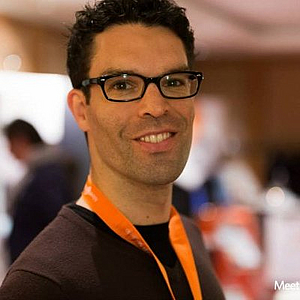Get in touch


In part 2 of the interview, Sylvain Rayé talks about advantages and disadvantages of Open Source software vs. proprietary software, reasons for agile web development methods in projects and explains how he became part of the Magento world and organizer of the Meet Magento CH conference in Zurich, Switzerland.
About Sylvain Rayé: Sylvain is a computer engineer and certified Magento developer with more than ten years of experience in web development. After his career started as project manager in the French Air Force, he worked for more than six years as CTO at rissip Online Learning.In 2013, Sylvain founded his own company Diglin in Zurich, Switzerland, specialized on bringing physical shops to the online business, based on Open Source products. Sylvain is very much involved in the Magento world. He is a contributor to the Magento community, was vice president of the Magento community Firegento and organizes the Magento Hackathons in Switzerland. Moreover, he is organizer of the Meet Magento CH conference in Zurich, Switzerland.
Please click here for part 1 of the Interview with Sylvain Rayé.
Sylvain, what pros and cons do you see for Open Source and proprietary products, especially when it comes to Enterprise projects, concerning performance and scalability? Do you have an example?
With Open Source products I see the opportunity to not be restricted by the needs and creativity of a project, in contrast to proprietary products, which are often closed source or need expensive consultants for customization. As agency or developer, we can also benefit from more possibilities to contribute to a project and improve the product. Regarding the performance, I don’t see any reason why an Open Source or proprietary product could be more or less efficient. In both Open Source and proprietary you have good and bad products, however, in an Open Source product you are free to modify it to fit your needs.
What about security concerns concerning Open Source products? Open Source products are sometimes described as “not Enterprise ready” and are considered to be less secure than proprietary systems in terms of system security and data protection. How do you respond to that?
Today, most servers run under Unix systems, lots of Enterprise applications run under Tomcat or JBoss and there are lots of other such examples I could give. They have all in common that they are Open Source, so if Open Source software were a security issue, it wouldn’t be so largely adopted, especially in Enterprise. They do have security issues, but because the source code is accessible, it’s easier to find a breach; however, the breach can also be fixed faster and fixes can be redistributed faster.
Proprietary software also has security issues, e.g. Adobe with Flash, Microsoft with Windows or today even Apple with IOS, which claimed for years that it is a secure platform. These examples show that to be “closed” doesn’t mean to be secure.
The projects you do are Agile. What do you think are the advantages of Agile projects? How do Agile projects work in practice?
I use Scrum only for projects that last several months. For smaller projects it doesn’t make sense. I tried to do it but you have too much overhead in management and have risks to do multitasking projects. In this case, I use Kanban which is task-focused. The advantage for the customer is they have a delivery after each sprint when Scrum is used. The customer participates actively with the team, as he is really a part of the team. For the team, the participation is more interesting, they don’t feel they are just a “number” as they are actively engaged in the project. They have smaller targets in short time periods, so it doesn’t feel that it is an endless project.
Did you ever have bad experiences with agile projects? What are reasons why agile projects do not work? Do you have examples for this?
When I was trained as a Scrum Master and came back to the company I worked for, I was really motivated and thought that it is something that will bring more efficiency in the progress of projects. However, if you are the only one in the company who understands what it is and the management doesn’t get the point, it’s impossible to work with the Scrum methodology. In my case, we planned sprints but during those sprints we were disturbed by changing priorities, so even one-week sprints were broken.

As you mentioned, you are a certified Scrum Master. What are the roles and responsibilities of a Scrum Master in Agile projects?
A Scrum Master is a buffer. He prevents his team from being disturbed by any useless external intervention coming from management or the client. It doesn’t mean he blocks communications, but he ensures that the team concentrates on their tasks. He is also an animator and lets the team organize itself.
You are very much involved in the Magento world. You are certified Magento developer, have launched several Magento projects and are contributor to the Magento community. You were Vice President of the German Magento Community Firegento, you are organizer and contributor of Magento Hackathons in Germany and Switzerland. How do you manage all this and why do you do it?
I’m asking myself how I manage to do it ... I have a very understanding wife. :-) I stopped being part of the Firegento Association Board to reduce the workload a little and have more time for the organization of Meet Magento in Switzerland. However, I still participate in the events, including those organized by the OpenGento association in France: the MageConf in February and their hackathon in June. Participating in those meetings gives me great opportunities to learn more from the others instead of going it alone. It also helps me to build a network of great people in the Magento Community. There is a real good atmosphere in this community.
You are also organizer of the Meet Magento CH conference in Zurich, Switzerland. How and why did you become the organizer of this conference?
Thomas Fleck and Thomas Goletz from NR Apps are the founders of the Meet Magento conferences. As we have known each other for several years, they know how involved I am in the community. And, since I was starting my own business, we discussed the opportunity to organize a Meet Magento conference to further develop the community in Switzerland. The Swiss Magento community, initiated by Jan-Hendrik Heuing, grew under the leadership of Nick Weisser from Openstream, who organizes Meetup in Zurich. Matthias Zeitz from Swiss Online Group joined me in the Meet Magento organization since the 1st edition in 2014 and we are glad to announce the second edition on 23rd October 2015.
What actually is a hackathon? Who goes to one, what are people doing there and why? What is the topic of this year’s hackathon?
A hackathon is a developer meeting for sharing experiences or developing proof-of-concept projects. Many Magento developers around the world use projects today that were developed during a hackathon. You can find a list of some of them on github.com/firegento and github.com/magento-hackathon. There is normally no topic for a hackathon except that projects are Magento-centric, developers decide during the event what they want to do, we list the projects and vote for the most relevant.
Sylvain Rayé, merci pour votre temps!
Merci à vous pour cet entretien
In part 1 of the interview Sylvain Rayé talks about success factors in E-Commerce projects, gives tips, insights and examples for online shops and what is necessary for digital transformation.